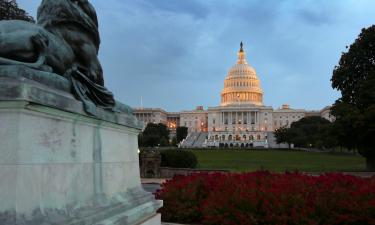The People vs. Harry Potter
Sometimes people rank the little magician among totalitarian sects
It seems that following foreign countries and Central Russia, the Russian city of Irkutsk is now also enveloped with the social phenomenon called "parents vs. Harry Potter" which is one of manifestations typical of the generation gap. There are some groups of people in Irkutsk who have stopped complaining about the expensiveness of books and films about Harry Potter, of toys somehow connected with the little magician. Some have even claimed that the popular book hero created by JK Rowling's whimsical fantasy may be dangerous.
The hail of protests against the little magician has come from where Harry Potter arrived himself, from abroad. Ministers of religion were the first to "discern" danger in the book. Right on the peak of the story's popularity clergymen pronounced an anathema against the popular fairy tale. The basic claim of the church resembled popular sentences passed on people by the Medieval Inquisition: clergymen say that the books by JK Rowling popularize witchcraft, black magic, devilry and paganism; they say the books lead young minds astray to an evil way.
Priest Alexander from the Church of Ksenia of St.Petersburg in the city of Irkutsk says it is his personal opinion and at the same time he confirms the negative attitude of the Russian Orthodox Church to the films about Harry Potter. "Why do you think the number of drug addicts, criminals and alcoholics has so considerably increased among children and teenagers? This fact is mostly explained with the lack of spirituality and much cruelty we see on TV."
Then the priest was told that the situation in Russia has been evident for several years already, while the books by JK Rowling appeared just some time ago. But the priest still insisted that books of the Harry Potter type just aggravate the negative situation.
To tell the truth, there are many Russian fairy tales with witches, house-spirits, wood-goblins and werewolves. What about these fairy tales? After a second of consideration priest Alexander admitted that the church treated such fairy tales negatively as well as they are in fact remnants of paganism in people's minds; it is no good to support and develop these remnants. "It is now very important to bring up youth properly. Remember that the church cannot prohibit anything it can only recommend."
The best experience is your own one. When first rumors about negative attitude of parents to Harry Potter appeared, I myself was seized with panic as I have an 8-year-old child whose psyche was seriously undermined with the previously popular mania of Pokemons (indeed, the strange creatures were really extremely popular among children some time ago).
It took me some time before I risked asking my son openly if he knew who Harry Potter was. The child looked over me thoughtfully and answered: "I don't know yet, but some guys at school have already read about him."
To have a clear picture of the situation I decided to take an absolute control over it. However, the film about Harry Potter hasn't produced any vivid impression upon the child. One of the books about the little magician has been staying on the bookshelf for a week already; the son says he has read ten pages of it which in fact may be not true (I think he has read just about 8 pages). So, I say that my child hasn't turned into a zombie with the stories about Harry Potter. I hoped at least that the popular books will urge my son to read more.
The community is the best and the most active part of the electorate. The local public community of Irkutsk is rather numerous: if the people are involved in works at the Irkutsk hydroelectric power plant it may rotate the rotors of the plant by hand and supply the city with a great volume of electric power all year round.
When some representatives of the local public community said he was seriously anxious about the Potter-mania among children (the man read about the damage of this sort of literature in a local magazine), his statement nearly provoked a prohibition for purchase of the books about Harry Potter to local libraries of Irkutsk.
However, the Irkutsk regional Mark Sergeyev library disapproves of the efforts taken by the radical public community. Scientific Secretary of the library Tatyana Maksoyeva says officials of the library read the review on the books about Harry Potter saying that the book is nearly the same as a Satanism guidebook; however librarians disagree with the harsh statements of the review. "It is an ordinary children tale; it is not a satanic book. Children like it as well as stories by Astrid Lindgren or Kipling. We didn't have an intention to give up purchase of the books about Harry Potter; now we are looking for purchase of the fifth story by JK Rowling."
It is very interesting that student Olga Ignatyeva from the Irkutsk University wrote a term paper on Harry Potter some time ago. The theme was suggested by her foreign literature tutor Irina Bukharova. Olga became so interested with the Potter-mania that the student preferred the subject for her degree research when she graduated from the University the past spring.
According to information provided by the network of bookstores in Irkutsk, about 5,000 copies of each of the four stories about Harry Potter have been sold in the city (the total number is a bit less than 20,000 copies). Orders are already coming for the fifth book about Harry Potter, but they will be accepted only at the beginning of the next year when the Russian-language version of the book "Harry Potter and the Order of the Phoenix" comes out.
When Olga Ignatyeva was in the forth year of her studies at the University, her tutor Irina Bukharova gave her a book, the first one that appeared in Moscow about Harry Potter, "Harry Potter and the Sorcerer's Stone." The book wasn't yet popular in the city of Irkutsk. Olga liked the book and decided to study it in her term paper. Together with her tutor Olga considered Harry Potter from a cultural point of view. Later the student finished her degree research which was a thorough study of Harry Potter. The hero of the popular books was considered from a social and artistic aspect there.
The term paper was written in 2000 when the new magician wasn't yet popular among children and teenagers. That is why the term paper of the student was mostly a research of the book's story and the reasons of its popularity. Olga says: "Unfortunately, we failed to reach a well-defined conclusion that is why we continued the issue in my degree research. Some people say the book became popular thanks to wonderful promotion and advertising. But I say that if the book was untalented, no promotion and advertising would help make it really popular. This is typical of adults that we can read a book just because it is popular; the situation is quite different with children: they will readily reject this large volume of information if it is dull. In fact, the book is really very popular among children and teenagers, especially in Europe and America where children usually read rather unwillingly."
Olga says that the book is a wonderful combination of a personage, subject and genre; this is a fairy tale in the form of a novel supplied with elements of fantasy and detective. At that, the novel includes four novel types where the English classical Gothic style prevails.
Olga says that when she wrote her degree research she had to find out the public opinion on the subject. She questioned about 50 pupils at the age of 12-15. As it turned out from the poll, schoolchildren who read the book and then watched the movie liked reading the book most of all.
Contrary to the popular opinion that negative personages are the favorite ones in children books, it turned out that in this case children like the positive character Harry Potter for his personal traits.
The main phenomenon of the books about Harry Potter is that not only children but also their parents read these books and discuss them afterwards. That is why it is impossible to find out the age qualification of the books by JK Rowling. "There are no parents who prohibit their children reading the books by JK Rowling. They say: "It is good that children read at least something; and the book is also very nice, we also read it."
Why is it so that the attitude of the church to books about Harry Potter is so negative? In fact this is not quite right. There are some priests abroad who speak in support of Harry Potter. Some of the clergymen say the books by JK Rowling are some analogue of the Bible; some even compare Harry Potter with little Jesus Christ: "He is as good as little Jesus." One of clergyman even served a mass in a suit imitating that of Harry Potter. When the film-making was in the process, many parishioners strongly objected to shooting in the Gloucester Cathedral as they couldn't agree that a film about sorcerers can be made in the cathedral. However the priest said that shooting of the film in the cathedral will attach particular spirituality to the screen version of the book about Harry Potter.
Bert Kork
Subscribe to Pravda.Ru Telegram channel, Facebook, RSS!





